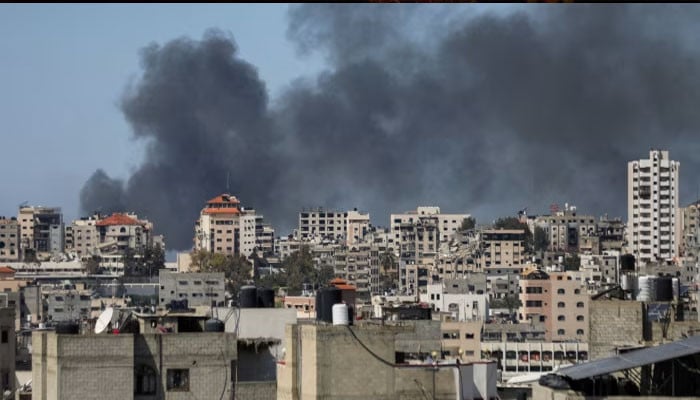[ad_1]
Sudama Devi (37), a resident of Dhabauli village under Mohammadpur Sura panchayat, does not have enough food to feed her five children. Her husband, Raghuvir Ram, died three years ago, leaving her in penury. She cooks using a chullah (earthen stove) and collects firewood for it, but she can’t afford to cook daily. There are holes in the clay and straw that make up her hut, a look inside which is proof enough of her distress. Bamboo sticks and a homemade mattress covered with a dirty sheet is the bed on which she sleeps along with her children. Her dwelling is reached by a long walk, crisscrossing fields. Suman Kumar, 13, her oldest child, was eating poor quality rice with water and salt, when this reporter met him.
“It is hard to survive after the death of my husband. I am unable to sustain life without two meals a day. I have already borrowed ₹5,000 from a local trader at high interest rates. For the past three months, I have not received my wages. If I don’t get my wages, how will I survive?” Ms. Devi said, weeping.
Ms. Devi is among the many workers under the Mahatma Gandhi National Rural Employment Guarantee Act (MGNREGA) scheme in Bihar who have not received their wages in the past four months. Were the money to be released for the 35 days of work she has done, it would afford her some relief.
There are approximately 25,000 MGNREGA workers in the district with their wages pending despite having completed the work assigned to them. Government officials cite insufficient funds as the reason for the delay. Workers also allege rampant corruption as a reason for the non-payment of their wages.
Sunita Devi (40) of Chorniya Village under Beruwa panchayat in Gaighat block faces a similar fate. With four children to support, she rarely has dinner as she distributes whatever food is available between the children. Ms. Sunita Devi, too, has not received wages for 45 days of work she did between March and July 2023, a sum of about ₹10,000.
“I have been running pillar to post to get my wages. However, the official at the block office says every time that the money will be transferred after funds are allotted by the Central government. I don’t know what the process is but my family is suffering and I am only concerned about the wages that are due to me,” Ms. Sunita Devi said.
In Muzaffarpur, 80% of the workers under the MGNREGA scheme are women as their husbands have migrated to other States, looking for better paid work they aren’t able to find here as daily wage earners.
In Godanpatti village, 48-year-old Suresh Ram’s wages for 35 days of work have been delayed for more than five months. He is a registered worker under the MGNREGA scheme. Mr. Ram alleged that block-level officers asked for bribes to transfer wages.
Out of 13 lakh workers registered under the MGNREGA scheme in the district, 3.74 lakh are active workers with wages pegged at ₹228 per day. Bihar has about 1.09 crore active workers under the Central scheme, which gives rural families the right to 100 days of employment every year. Each worker earns between ₹10,000 to ₹12,000 a year, but that too has become uncertain now.
Sanjay Sahni, coordinator of MGNREGA Watch, an NGO based in the district, said that around 25,000 workers in several blocks, including Gaighat, Bochaha and Kurhani, have not received their wages.
“They are supposed to get a 100 days of work out of 365 days but you won’t find a single worker who has got 100 days’ work. The worst of it is that despite executing the work, they do not receive the payment on time, which leads to a painful life for people who are mostly poor. Most of the workers have borrowed money at high interest rates to run their families,” Mr. Sahni said.
In several cases, workers faced issues in marking attendance using the National Mobile Monitoring System (NMMS), which was made mandatory at all MGNREGA worksites from January 1 this year.
Asked about workers not receiving their payments on time, Amit Kumar Upadhyay, District Programme Officer, MGNREGA, Muzaffarpur, said the issue has been solved. “In our district, the timely payment is 93%. This means, out of every 100 workers, 93 are paid in a timely way. Actually, we were not receiving the funds in the central account of the Rural Development Department in Patna, which comes from Centre. Due to the delay in receiving the funds, the issue of non-payment was there, but it has been solved now,” Mr. Upadhyay said.
“There are some issues with the Aadhaar-based wage payment, which is the future of MGNREGA. Many beneficiaries have not linked their Aadhaar with their bank accounts, due to which the delay happens in transferring the money. In many cases, the KYC is not updated, which again becomes an obstacle in making the payment to the workers. We will try to resolve all the issues on a priority basis,” he added.
The Programme Officer of Gaighat block, Manoj Kumar, echoed the same view, claiming that wages are being disbursed in a timely manner, and most of the payments due up to August 10, 2023 had been cleared.
[ad_2]
Source link












































